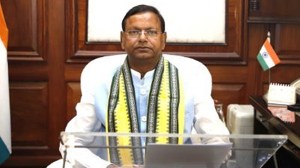Petulance and opportunism
Why has there been such a frantic reaction from some powers to the Pokharan explosions? Certainly, some may be genuinely concerned about nuc...

Why has there been such a frantic reaction from some powers to the Pokharan explosions? Certainly, some may be genuinely concerned about nuclear proliferation per se but, at least partly, an explanation may also be found in an important consequence which has become increasingly manifest over the past few weeks. Fingers are being pointed at the five nuclear-weapon states: you lecture India and Pakistan but what are you doing about reducing, let alone destroying, your huge nuclear-weapon arsenal? This question, so uncomfortable for the five, has come from voices as disparate as the non-permanent Afro-Asian members of the Security Council, eight foreign ministers in a joint declaration Egypt, South Africa, Mexico, Brazil, Sweden, Ireland, Slovenia and New Zealand, the campaign for nuclear disarmament and even some Japanese leaders.
A former Japanese minister says Japan has unthinkingly followed the United States, without realising the substance of India8217;s contentions on nuclear disarmament; former PresidentJimmy Carter uses the word hypocrisy8217; on US nuclear policy; Henry Kissinger, not the most popular person in India, sees some justification for India8217;s nuclear policy. A scientist of the Doomsday Clock points out that it is important to view events in the subcontinent in the perspective of the nuclear weapons already existing: only some obsolete weapons have been destroyed while modern weapons are kept ready.
The question nicely reflects something of India8217;s concerns on the CTBT. The Swedish ambassador at a conference in Washington gets to the heart of the matter: unless the nuclear powers can convince the world that they are abolishing their nuclear weapons, others will follow India8217;s suit. There you have it. The nuclear-weapon powers see their cosy little world of nuclear supremacy dissolving before their eyes. They react with the petulance of a spoilt child deprived of its toys.
In this wild thrashing around, they forget diplomatic norms. In several statements, such as the Security Council presidentialstatement of May 29, or the P-5 statement from Geneva, they blithely ignore India8217;s declaration of a unilateral moratorium on nuclear tests as also its willingness to join the negotiations on fissile material cut-off and its readiness to sign a bilateral or multilateral treaty on no first-use of nuclear weapons.
Madeleine Albright says India8217;s bona fides in making these commitments are doubted. In other words, the United States Secretary of State is saying that the Indian Prime Minister may be lying. An Indian might be forgiven for thinking that he could, with much greater justification, entertain the deepest suspicion of US policy on nuclear disarmament.
India8217;s stand on nuclear disarmament cannot be doubted. The first country to introduce in the UN, in 1954, a resolution calling for the banning of nuclear tests, India perhaps has been more active than any other in proposing, sponsoring and supporting UN resolutions towards nuclear disarmament. It is also the only country to introduce a comprehensive,time-bound plan for the reduction and elimination of all nuclear weapons. But what of the subcontinent? The remarks of Abdul Qader Khan, commonly described as the father of the Pakistani nuclear programme, are relevant. He is reported to have said that the work in his laboratories could be crucial to avoiding a war because neither country would be so insane as to attack the other with nuclear weapons. Can anyone doubt that?
Equally apposite are the words of a former Chairman of the Pakistan Atomic Energy Commission that India8217;s nuclear programme is not Pakistan-centric. Admittedly, these were uttered some time before the Pokharan explosions but they will in any case be ignored by Pakistan because that country will undoubtedly use, in every possible way, the opportunity to introduce outside meddling in the subcontinent8217;s affairs.
To this effort is added President Clin-ton8217;s sudden announcement that China must have a say in these affairs. Was he, yet again, seeking to curry favour with the Chinese on theeve of his visit to China? Was he indicating to India that he had other threats up his sleeve, to be revealed as needed in order to bend India to US nuclear policy? Whatever the reasons the petulance of some in the P-5, combined with Pakistan8217;s opportunism, ensures for some time an appearance of instability on the subcontinent.
There is no doubt that India will be subject to great and increasing pressures. I am reminded of an instance recounted in B K Nehru8217;s memoirs. At some time in the early Fifties the British announced their intention to withdraw guarantees on exports to India. This the government of India viewed seriously, for the world then tended to take its cue on India from Britain.A series of meetings was held in government till K B Lal, then additional secretary in the commerce ministry, thought up a formulation. He summoned the British High Commissioner. India, he said, hated to distress the British by forcing them to withdraw export guarantees. To save them the embarrassment, he had ordersunder issue by which no goods from Britain would be licensed for import into India and no India government orders would be placed with Britain. Within twenty-four hours the proposed British regulations were withdrawn and export guarantees continued.
Can we do something similar today? We can wait for some time to see whether the most advanced industrial eight remain inflexible. If they do, can we summon a couple of them and speak to them as Lal did? We could add that we intended to waive their ban for humanitarian purposes8217; and our ban would continue for some time beyond any period they might have intended.
Of course our exports will be badly hit. Will this matter so much when we will not require the foreign exchange for the imports which will no longer be coming in? I do not pretend to assert beyond doubt that in today8217;s circumstances we can act as we did in the Fifties.
This will require careful study; but in any case the US ban, if fully implemented, will cause us 8220;excruciating economic pain8221;.In the words of Karl Inderfurth, US Assistant Secretary of State for South Asia, Iraq and Cuba have borne that pain. If we can stand firm, we may see a genuine move towards nuclear disarmament from the Five, for the longer we stand firm the more likely that others will follow our suit. The charade of nuclear hegemony will begin to unravel still faster. It is this that the Five fear.
The writer is a former foreign secretary
- 01
- 02
- 03
- 04
- 05































